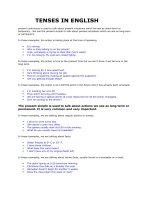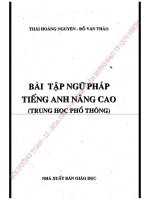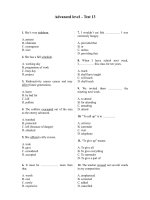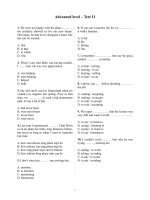Ngữ pháp tiếng Anh nâng cao
Bạn đang xem bản rút gọn của tài liệu. Xem và tải ngay bản đầy đủ của tài liệu tại đây (99.19 KB, 22 trang )
TENSES IN ENGLISH
present continuous is used to talk about present situations which we see as short-term or temporary
. We use the present simple to talk about present situations which we see as long-term or
permanent.
In these examples, the action is taking place at the time of speaking.
• It's raining.
• Who is Kate talking to on the phone?
• Look, somebody is trying to steal that man's wallet.
• I'm not looking. My eyes are closed tightly.
In these examples, the action is true at the present time but we don't think it will be true in the long
term.
• I'm looking for a new apartment.
• He's thinking about leaving his job.
• They're considering making an appeal against the judgment.
• Are you getting enough sleep?
In these examples, the action is at a definite point in the future and it has already been arranged.
• I'm meeting her at 6.30.
• They aren't arriving until Tuesday.
• We are having a special dinner at a top restaurant for all the senior managers.
• Isn't he coming to the dinner?
The present simple is used to talk about actions we see as long term or
permanent. It is very common and very important.
In these examples, we are talking about regular actions or events.
• I drive to work every day.
• She doesn't come very often.
• The games usually start at 8.00 in the evening.
• What do you usually have for breakfast?
In these examples, we are talking about facts.
• Water freezes at 0° C or 32° F.
• I have three children.
• What does this word mean?
• I don't have any of my original teeth left.
In these examples, we are talking about future facts, usually found in a timetable or a chart.
• The plane leaves at 5.00 tomorrow morning.
• Christmas Day falls on a Sunday this year.
• Ramadan doesn't begin for another 2 weeks.
• Does the class begin this week or next?
In these examples, we are talking about our thoughts and feelings at the time of speaking. Notice
that, although these feelings can be short-term, we use the present simple and not the present
continuous.
• I think you are wrong.
• She doesn't want to do it.
• They don't agree with us.
• Do you understand what I am trying to say.
We use the Present Simple
• for regular actions or events
I watch TV most evenings.
• facts
The sun rises in the east
• facts know about the future
The plane leaves at 5.00 in the morning.
• thoughts and feelings about the time of speaking
I don't understand.
We use the Present Continuous
• at the time of speaking ('now')
I'm watching a movie on TV.
• things which are true at the moment but not always
I'm looking for a new job.
• present plans for the future
I'm taking my husband to New York for his birthday.
Look at these sentences:
• I usually don't drink coffee but I'm having one this morning because there is nothing else.
• I often drive to work but I'm taking the train this morning because my car is in for repair.
• I'm thinking about dying my hair blonde but I don't think my wife will be very happy about
it.
• My parents live in New York but I'm just visiting.
Notice how in all these examples we use the present continuous to talk about events which are
temporary/limited in time and the present simple to talk about events which are habits/permanent.
We use the past simple to talk about actions and states which we see as completed in the past.
We can use it to talk about a specific point in time.
• She came back last Friday.
• I saw her in the street.
• They didn't agree to the deal.
It can also be used to talk about a period of time.
• She lived in Tokyo for seven years.
• They were in London from Monday to Thursday of last week.
• When I was living in New York, I went to all the art exhibitions I could.
You will often find the past simple used with time expressions such as these:
• Yesterday
• three weeks ago
• last year
• in 2002
• from March to June
• for a long time
• for 6 weeks
• in the 1980s
• in the last century
• in the past
We use the past continuous to talk about past events which went on for a period of time.
We use it when we want to emphasize the continuing process of an activity or the period of that
activity. (If we just want to talk about the past event as a simple fact, we use the past simple.)
• While I was driving home, Peter was trying desperately to contact me.
• Were you expecting any visitors?
• Sorry, were you sleeping?
• I was just making some coffee.
• I was thinking about him last night.
• In the 1990s few people were using mobile phones.
We often use it to describe a "background action" when something else happened.
• I was walking in the street when I suddenly fell over.
• She was talking to me on the phone and it suddenly went dead.
• They were still waiting for the plane when I spoke to them.
• The company was declining rapidly before he took charge.
• We were just talking about it before you arrived.
• I was making a presentation in front of 500 people when the microphone stopped working.
Both the past simple and the past continuous refer to completed actions in the past.
Most of the time when we are talking about such actions, we use the past simple. This is by far the
most common way about talking about the past.
• I lived there for 6 years.
• I only found out a few moments ago.
• I asked her but she didn't know anything.
• The company made 100 people redundant last year.
Only use the past continuous when you want to emphasize the continuity of the action.
• Everybody was talking about it all evening.
• They were really trying hard but couldn't do it.
• I was thinking about you the other day.
• Were you expecting that to happen?
When we use these two forms in the same sentence, we use the past continuous to talk about the
"background action" and the past simple to talk about the shorter completed action.
• It was raining hard when we left the building.
• I was reading the report when you rang.
• He was going out to lunch when I saw him.
• The company was doing well when I last visited it.
First the good news - all new verbs in English are regular.
• I photocopied the report.
• She faxed it to me.
• They emailed everybody about it.
However, that doesn't help you to learn the approximately 180 irregular verbs which do exist.
Luckily some of these are extremely rare but many others are very useful and you need to know
them.
So how do you learn them? Some teachers think you should learn a list of them 'by heart'. Other
teachers think you should not learn them at all – you will just gradually acquire them over time.
One useful method is to note down new irregular verbs as you meet them. But how should you note
them?
It is useful to put these verbs (or any vocabulary you want to learn) into sentences and learn those
rather than the individual word.
Which do you think is easier to learn?
stick stuck stuck
I stuck the photo into my album.
Another good technique is to classify the irregular verbs into 4 categories.
1. All forms the same
cost cost cost
set set set
2. Similar sound groups
beat beat beaten
eat ate eaten
.
blow blew blown
throw threw thrown
.
drink drank drunk
sing sang sung
.
speak spoke spoken
wake woke woken
3. The second and third forms are the same.
bend bent bent
sleep slept slept
spend spent spent
.
bring brought brought
buy bought bought
teach taught taught
.
have had had
pay paid paid
say said said
4. The "unclassifiables"
come came come
do did done
go went gone
show showed shown
As you meet new irregular verbs, try to decide in which category they fall.
(British English and American English have different rules for the use of the present perfect. The
comments being made here and the exercises state the correct grammar for British English.
However, in American English, it is often considered acceptable to use the past simple in some of
these examples.)
We use the present perfect when we want to look back from the present to the past.
We can use it to look back on the recent past.
• I've broken my watch.
• She's taken my copy.
• They have cancelled the meeting.
• The company has doubled its turnover.
Often when we look back on the recent past we use the words 'just' 'already' or the word 'yet' (in
negatives and questions only).
• I've just finished.
• She's just arrived.
• We've already spoken about that.
• They've already met.
• I haven't finished yet.
• They don't know yet.
• Have you spoken to him yet?
• Has he got back to you yet?
We can also use it to look back on the more distant past.
• I've been to Singapore a lot over the years.
• He's done this type of project several times before.
• They've talked about it in the past.
• We've spoken to them on several occasions over the years.
Often when we look back on the more distant past we use the words 'ever' (in questions) and
'never'.
• Have you ever been to Indonesia?
• Has he ever spoken to you about the problem?
• I've never met him.
• We've never considered investing in Canada
We use the present perfect continuous to talk about an action or actions that started in the past and
continued until recently or continues into the future.
Sometimes it refers to an action that has finished but where you can still see evidence.
• You look tired. Have you been sleeping properly?
• I can smell smoke. Has somebody been smoking?
• I've got a headache and a stiff neck. I've been working too long on computer.
Sometimes it refers to an action that has not finished.
• I've been waiting for him for 30 minutes and he still hasn't arrived.
• I've been learning English for 20 years and I still don't know very much.
• He's been asking me about it for days. I wish he would stop.
Sometimes it refers to a series of actions.
• He's been phoning me all week for an answer.
• I've been writing to her regularly for a couple of years.
• The company has been sending students here for over twenty years.
Typical time expression that are used with the present perfect continuous include 'since', 'for', 'all
week', 'for days', 'lately', 'recently', 'over the last few months'.
• He's been working here since 2001.
• I've been wanting to do that for ten years.
• They haven't been answering all week.
• She hasn't been talking to me for days.
• I've been working hard lately.
• We've been looking at other options recently.
• You haven't been performing well over the last few months.
There is often very little difference between the present perfect simple and the present perfect
continuous. In many cases, both are equally acceptable.
• I've lived here for 10 years and she has been living here for 12 years.
• They've been working here for a long time and Andy has worked here for even longer.
When we want to emphasize the action, we use the continuous form.
• I've been working really hard lately.
• She's been having a hard time.
When we want to emphasize the result of the action, we use the simple form.
• I've phoned 32 people today.
• She's written a 64 page report.
Look at these examples to see the contrast.
• I've been driving for 5 hours and I've driven 500 miles.
• She's been speaking on the phone for 20 minutes and she's not managed to convince him
yet.
• We've been talking about this for month and we still haven't found a solution.
If an action is finished and you can see the results, use the continuous form.
• Your eyes are red. You've been crying.
• You're out of breath. Have you been running?
If you use the words 'ever' or 'never', use the simple form.
• I've never met her.
• Have you ever heard anything so strange in your life?
(British English and American English have different rules for the use of the present perfect. The
comments being made here and the exercises state the correct grammar for British English.
However, in American English, it is often considered acceptable to use the past simple in some of
these examples.)
We use the past simple to talk about actions in the past that have finished. It talks about 'then' and
definitely excludes 'now'.
We use the present perfect simple to look back on actions in the past from the present. It always
includes 'now'.
These sentences are in the past with no connection to the present.
• I first met him 10 years ago.
• I started work here in 1987.
• I ate too much at lunchtime.
Now look at these same situations seen from the present.
• I've known him for 10 years.
• I've worked here since 1987.
• My stomach hurts. I've eaten too much.
Typical time phrases that we use with the past simple are 'yesterday', 'ago', 'last year', 'in 1999'.
• I spoke to him yesterday.
• She came in a few moments ago.
• We made our last purchase over a year ago.
• He joined the company in 1999.
Typical time phrases that we use with the present perfect are 'ever', 'never', 'since'.
• I've never seen so many people.
• Have you ever been more shocked?
• I've done a lot since we last spoke.
Typical time phrases always used with the present perfect in British English but often used with the
past simple in American English are 'already', 'just', 'yet'.
• I haven't done it yet. (UK)
• I didn't do it yet. (US)
• I've just done it. (UK)
• I just did it. (US)
• I've already done it. (UK)
• I already did it. (US)
The time phrase 'for' can be used with both forms, but with different meanings.
• I went to Munich for the weekend but I came back on Sunday evening.
• I've been in Munich for the weekend and I've brought you back some German sausages.
We use the past perfect simple to talk about what happened before a point in the past. It looks back
from a point in the past to further in the past.
• I hadn't known the bad news when I spoke to him.
• I checked with the supplier and they still hadn't received the contract.
• She had already told him before I got a chance to give him my version.
• The company has started the year well but was badly hit by the postal strike.
The past perfect simple is often used when we report what people had said/thought/believed.
• He told me they had already paid the bill.
• He said he believed that John had moved to Italy.









